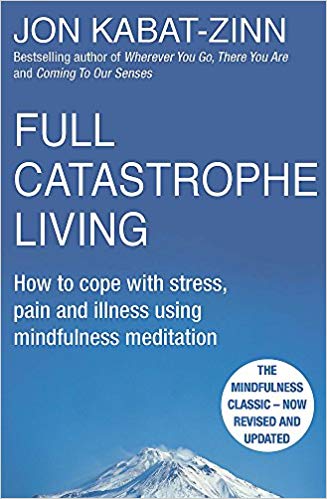In this book, Kabat-Zinn describes the Mindfulness-Based Stress Reduction (MBSR) programme that he originally developed in 1979 and that was (and still is) taught at the Stress Reduction Clinic in Massachusetts. Kabat-Zinn’s incredible contribution to participatory medicine in the form of MBSR is now world-famous, and has led to a surge in research in this area, including the development of Mindfulness-Based Cognitive Therapy (MBCT). First published in 1990, this revised edition acknowledges the significant growth in mindfulness research in the intervening period. While this book is accessible to those new to mindfulness, it is a hefty volume, and so, ambitious readers aside, this might be better suited to those looking to deepen their understanding of MBSR.
The words for ‘heart’ and ‘mind’, often the same in Asian languages Kabat-Zinn reminds us, means ‘if you are not hearing or feeling the word heartfulness when you encounter or use the word mindfulness, you are in all likelihood missing its essence.’ As well as the seven attitudinal factors essential to mindfulness practice (to which he later added kindness, gratitude and generosity), Kabat-Zinn adds that personal vision is also enhancing: ‘Perhaps it could be a vision of what or who you might be if you were to see more clearly into the ways in which your own mind might be limiting your possibilities for growth, even around what your body might be capable of if you were to accept and learn to work within its limitations of the moment.’ This in itself requires a degree of openness when starting a mindfulness course.
The eight-week programme is covered in detail, but there are also additional subtle ways to develop personal practice, such as incorporating questions into a meditation. One example Kabat-Zinn gives is ‘what is my own way […] Right now, what is my own way’. The emphasis is not on grasping at answers when we are lost, instead ‘It is sufficient to ask the question. Trying to answer it is not necessary. It is more fruitful just to ponder the question, keeping it alive from moment to moment, listening for the response from within your heart.’ Many participants discover at this point they are already living their own way, rather it’s always wanting things to be different, wanting the next thing that is causing suffering. Such a realisation can move us on to seeing ‘with eyes of wholeness’, to accept ourselves and our lives fully as they are.
The case histories covered demonstrate the diverse range of stressors that brought participants to the clinic, and the many obstacles they faced in practice and how these were addressed. There’s also plenty on the physical benefits of mindfulness – on the immune system, blood pressure, heart rate, and even the length of your telomeres. Individual chapters focus on working with pain and illness, emotional pain and anxiety, every type of stress (time, work, people and even ‘world stress’), so the breadth of application for mindfulness is clear.
Mindfulness meditation is all about accepting what is here right now, what is here in our thoughts, in our feelings and in our body, and exploring how we are relating to what is here. Ultimately, ‘Profoundly healing insights may arise if you are willing to look deeply into your emotional pain as it is occurring, as well as in its aftermath. One major realization you might come to is the inevitability of change, the direct perception that, whether we like it or not, impermanence is in the very nature of things and relationships.’ This is seen in working with pain too.
The possible benefits of mindfulness as a way of being are so significant that it’s a shame when people dismiss it, having never tried it, or having tried a meditation once or twice to find it ‘didn’t work’. The author is clear: ‘Meditation is not relaxation spelled differently’, it’s not about trying to achieve a special state, it’s about ‘whether you are willing to look and to be with things as they are in any moment, including discomfort and tension and your ideas about success and failure.’ In doing so we can start to recognise all the judgements that come with them, and have the choice to step away from them.



